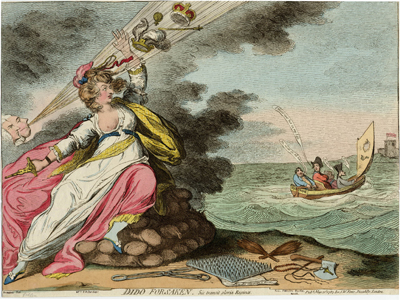Dido Forsaken
In Vergil's great latin epic, the The Aeneid, the Trojan hero Aeneas is nearly prevented from fulfilling his destiny as the future founder of Rome by an affair with Dido, the beautiful and widowed Queen of Carthage. But thanks to some timely reminders from friends in high places (Zeus and Mercury), Aeneas eventually comes to his senses and once again sets sail for Italy, leaving the distraught Dido to kill herself on her own funeral pyre. In Dido Forsaken, Gillray enlarges on the parallels between the unfortunate Queen of Carthage and the Prince's paramour, the beautiful and twice-widowed Maria Fitzherbert.

© Trustees of the British Museum
In 1784, the Prince of Wales, like Aeneas, became infatuated with a widow who stood in the way of his destiny. Maria Fitzherbert was a Catholic. The Act of Settlement of 1701 had long disqualified any royal family member who dared marry a Catholic from succeeding to the throne, so marriage with Mrs. Fitzherbert would prevent the Prince from becoming King. To complicate matters, however, the recent Royal Marriages Act (1772) both forbade and refused to recognize any marriage by a royal family member entered into without the King's permission. Had he been asked, the King would never have allowed his son to marry a commoner such as Mrs. Fitzherbert, let alone a Catholic.
But none of this stopped the irresponsible Prince. On December 15, 1785, he married Mrs. Fitzherbert in a secret ceremony attended by members of her family alone. The marriage was the subject of wide speculation and at least two other prints by Gillray, Wife & No Wife... and The Morning after Marriage....
By 1787, the date of Dido Forsaken, the marriage was still publically unacknowledged and privately but ambiguously denied to the Prince's closest political allies, including Charles James Fox. As a result, in acrimonious parliamentary debates with William Pitt and Dundas about paying the Prince's debts, Fox had no hesitation in asserting that no disqualifying marriage had taken place. Though perhaps she should not have been surprised, Mrs. Fitzherbert may well have felt "forsaken" and upset by such a public denial of what she knew to be true and considered Fox somehow responsible. It was this context that Gillray's Dido Forsaken first appeared.
Dido (Mrs. Fitzherbert) is portrayed at the moment when, sitting on her funeral pyre with a crucifix held like a dagger in her hand, she sees Aeneas (the Prince of Wales) sailing off and abandoning her.
Several details make Mrs. Fitzherbert a less attractive and more culpable figure than in Gillray's two previous prints. First, her Catholicism is strenuously emphasized with the presence of birch rods, chains, a flail, a rosary, and axe, and a harrow under which a paper can be seen with the words "For the conversion of heretics. " The implication is that Mrs. Fitzherbert is actively trying to convert the Prince to her Popish beliefs. Second, her motives are now openly questioned. The "funeral pyre" looks to be suspiciously constructed with money bags and the crown, orb, and sceptre to which she is presumed to have been aspiring are being blown away by the pressure from Pitt and Dundas for the Prince to deny the marriage. As the print's subtitle suggests, "So goes the glory of the queen." Finally, Mrs. Fitzherbert's person and character are satirized. Unlike the more idealized depictions in his earlier prints, Gillray portrays her with a distinctly hooked nose, a fully exposed breast, and a belt labeled chastity—now significantly broken. She is cast, like Dido, as a fallen woman.
But if Mrs. Fitzherbert is now roundly satirized, the Prince and his friends are not wholly exempt.
With Charles James Fox at the tiller, Burke handling the sails, and the indolent North as ballast,
the Prince sails off towards Windsor Castle in a boat ironically called Honor with sails that are
as full of holes as the feeble protestations of the pathetically small men who are passengers:
The Prince: "I never saw her in my life."
Fox: "No, never in all his Life, Damme.
North:"No, never"
Burke: "Never"
Sources and Reading
- Commentary from the British Museum on Dido Forsaken
- "Maria Fitzherbert," Wikipedia
- Thomas Wright and R.H. Evans, Historical and Descriptive Account of the Caricatures of James Gillray
Comments & Corrections
NOTE: Comments and/or corrections are always appreciated. To make that easier, I have included a form below that you can use. I promise never to share any of the info provided without your express permission.